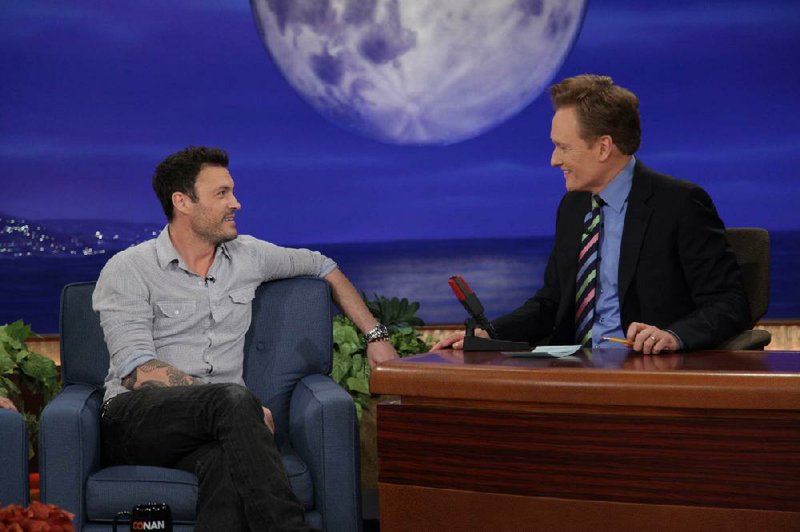LITTLE ROCK — It has been a few years since Conan O’Brien left The Tonight Show and he still hasn’t moved on.
In a video bit shot for Halloween on his TBS show, Conan, which just turned 2, he referred to a costume store’s big-chinned devil mask as Jay Leno. Minutes later, a conversation with Chelsea Handler turned awkward when he mentioned she now uses his Tonight Show theater. “We put a lot of work into that,” he said, before putting on a shell shocked face.
That episode was no exception. Recently, O’Brien responded defensively to a self-deprecating comment by Brian Austin Green about working on cable. “Hey, don’t knock cable,” O’Brien said. “I’m on cable now, too.”
The next day, Mindy Kaling, talking about her Fox show, The Mindy Project, said that when you put your name in the title, you’re harder to replace.
“That’s why I did it,” O’Brien said, pausing so everyone got the implication. “What an unpleasant little cul-de-sac we just wandered into.”
Isn’t it time to leave this dead end? While some grudges can be leveraged into explosive comedy, this one risks turning O’Brien into a darkly obsessed figure out of The Larry Sanders Show.
Certainly he went through a public ordeal in early 2010 when, only seven months after replacing Leno on The Tonight Show, he was told by NBC that it would reinstall Leno in the 11:35 time slot and push Conan’s Tonight Show to 12:05. O’Brien wouldn’t go along with the plan and left, though with a hefty severance (reportedly $32 million)in hand.
TIRED JOKES
But let’s face it: Jokes about Leno are even more tired than Leno’s jokes. And when Leno and David Letterman appeared on the shows of Craig Ferguson and Jimmy Kimmel last week, the late-night wars settled into a tense peace. O’Brien’s fixation on what he lost also reveals something about what he gained.
His brand of heady silliness was long suspected as being too quirky and rarefied for mainstream tastes. That common wisdom helped fuel the outpouring of support for O’Brien after NBC abruptly pulled its support.
But when he moved to TBS, he was liberated from the pressure of network television. He didn’t need to worry about living up to a legacy or beating Late Show With David Letterman in the ratings. So it’s been disappointing that O’Brien has produced a fairly conventional talk show - albeit with less famous guests.
DRIVEN TO PLEASE
His monologue remains standard fare, mostly banal topical jokes delivered in between familiar manic tics like his string-pulling dance or his overreactions to ordinary audience responses. Whereas Letterman’s refusal to pander can come off as fascinatingly grumpy, O’Brien’s hectic need to please can wear on you.
What makes the modest ambition of Conan so strange is that O’Brien has one of the most inventive comic minds of his generation. Not only did he write one of the best Simpsons episodes ever (“Marge vs. the Monorail”), but the early years of his NBC show, Late Night, are vastly underrated. Critics focused on his greenness, not the exciting flurry of ideas packed into each show.
With a writing staff that included Louis C.K., Bob Odenkirk and Robert Smigel, those raw shows played nothing straight. A premium was put on the unexpected, whether it be Tom Brokaw’s crushing saltines in his hands for a bit in which New Yorkers warned the new host that he had better be good, or a waiter interrupting an interview with Kevin Nealon for a wine tasting. Sketches were frequently integrated in a way that tried to reinvent celebrity chat.
IRREVERENT HUMOR
It also had a cheerfully irreverent style that served as the bridge between Letterman’s more hard-edged sarcasm and the more radical deconstructions of talk shows today. O’Brien also showed off a gentler side, ending one week with an appealingly sentimental campfire song with all his guests. It wasn’t that funny, but so what? It was different in a way that felt heartfelt and honest.
By contrast, on Conan, rarely is there a joke you could never imagine on another show. For late-night experimentation, Ferguson’s freewheeling monologues are far more daring. Of course, over the last two decades O’Brien, who turns 50 next year, has matured. But what’s become clear from his new show is the extent to which he is a traditionalist at heart.
O’Brien’s precocious career had been spent almost entirely in prestigious comedy institutions, like The Harvard Lampoon, Saturday Night Live and The Simpsons. When his upwardly mobile trajectory stopped at The Tonight Show, O’Brien said he wouldn’t move it to midnight because that would damage the franchise and legacy of the show.
Such deference to tradition seems out of step in an era of viral videos and podcasts. Or maybe it has always been at odds with the rambunctious essence of comedy. In The War for Late Night, a book by Bill Carter of The New York Times, Jerry Seinfeld appears baffled by O’Brien’s rationale.
“There is no tradition!” he says. “Conan has been on television for 16 years. At that point, you should get it: There are no shows! It’s all made up !”
Style, Pages 28 on 11/27/2012
